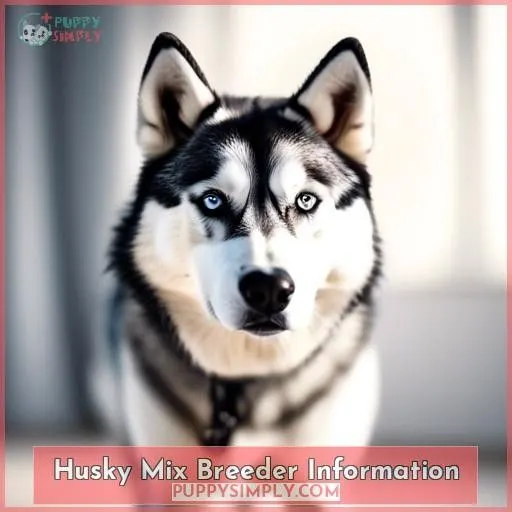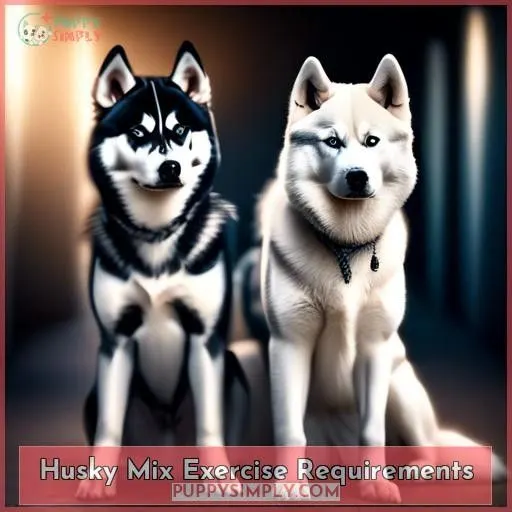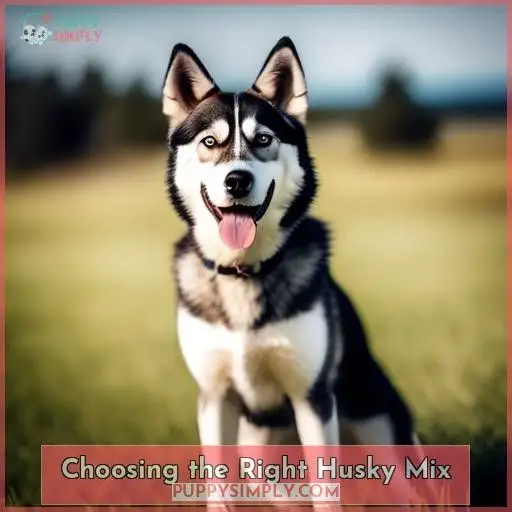This site is supported by our readers. We may earn a commission, at no cost to you, if you purchase through links.
Huskies typically range from 21 to 24 inches tall and 35 to 60 pounds, with males on the larger end. Husky mixes like Shepskies can vary greatly in size, often ranging from 50 to 100 pounds depending on the breeds involved.
Puppies will reach adult height around 12 months but continue maturing for 6-8 more months. While the size of your husky mix may be uncertain, a responsible breeder can help guarantee your new pup is a good fit for your lifestyle and home.
When considering a husky mix, look for a reputable breeder who prioritizes health and provides socialization. There’s more to explore about the fascinating world of husky mixes.
Table Of Contents
- Key Takeaways
- How Big Do Huskies Get Plus Size Info for Husky Mixes?
- Husky Size and Weight
- Husky Mix Size Variations
- Husky Mix Breeder Information
- Husky Mix Puppy Growth
- Husky Mix Adult Size
- Husky Mix Weight Distribution
- Husky Mix Health Concerns
- Husky Mix Exercise Requirements
- Husky Mix Grooming Needs
- Choosing the Right Husky Mix
- Frequently Asked Questions (FAQs)
- Conclusion
Key Takeaways
- Huskies typically range from 21 to 24 inches tall and 35 to 60 pounds, with males on the larger end.
- Husky mixes like Shepskies can vary greatly in size, often ranging from 50 to 100 pounds depending on the breeds involved.
- When considering a husky mix, look for a reputable breeder who prioritizes health and provides socialization.
- The size of a husky mix can be affected by the specific breeds involved, such as a husky-Akita mix which may weigh anywhere from 70 to 120 pounds.
How Big Do Huskies Get Plus Size Info for Husky Mixes?
Huskies typically grow to be medium-sized dogs, with adult males weighing up to 65 pounds and females weighing between 45 to 55 pounds. However, the size of a Husky can vary depending on factors such as genetics, nutrition, and exercise. Huskies are known for their muscular, agile build and are generally good at maintaining a healthy weight without much assistance from their owners.
Husky mixes, such as Shepskies, can also vary in size. Shepskies are typically medium to large in size, with most weighing between 45 to 88 pounds and standing at a height of 20 to 25 inches at the shoulder. Like purebred Huskies, the size of a Shepsky can be influenced by factors such as genetics and environmental factors. It’s essential to consult with a reputable breeder to get a more accurate estimate of the size of a Shepsky puppy.
Husky Size and Weight
Concerning huskies, size and weight differ greatly due to genetics, health, and diet. Huskies are known for their moderate size, with males typically weighing between 50 to 60 pounds and females between 45 to 55 pounds. However, size and weight can also be impacted by the specific breed of husky, such as a Siberian Husky or an Alaskan Husky, which may have different average weights.
For a husky mix breed, like a husky-akita, the weight range can be broader due to the combination of two distinct breeds. The Akita breed is larger than the Siberian Husky, so a husky-akita mix may weigh anywhere from 70 to 120 pounds. It’s important to keep in mind these weight variations when choosing a husky mix breed, as it can affect the dog’s suitability for different living situations and owner capabilities.
When thinking about a husky mix breed, it’s vital to take into account factors such as exercise requirements, grooming needs, and potential health concerns. For example, a husky-akita mix may have a higher exercise requirement due to the Akita’s hunting instincts, and may also have a thicker coat that requires more grooming.
Husky Mix Size Variations
When pondering a Husky mix, it’s imperative to comprehend the disparities in size and weight that can transpire. The magnitude of a Husky mix hinges on the breeds implicated, with some breeds contributing more to the mix’s comprehensive size. For example, a Husky blended with an Akita, a more substantial breed, might culminate in a more extensive Husky mix, weighing between 70-120 lbs. and standing 22-26 inches tall.
Conversely, a Husky blended with a more diminutive breed like a Maltese or Chihuahua would probably result in a less extensive Husky mix. The weight and height would be affected by the size of the more diminutive breed, with the Husky’s size also playing a role in the mix’s ultimate size.
It’s also crucial to observe that the size of a Husky mix can fluctuate even within the same litter. Genetic factors, such as the dominant genes from each breed, can sway the size of individual puppies in a litter.
When opting for a Husky mix, ponder the size you’re comfortable with and the space you possess available in your domicile. A more extensive Husky mix might necessitate more space and resources, such as a more extensive yard or more comprehensive grooming needs, compared to a less extensive mix.
Bear in mind that the size of a Husky mix isn’t the only element to consider when opting for a dog. Temperament, exercise prerequisites, and grooming needs are also imperative considerations.
Husky Mix Breeder Information
When contemplating acquiring a Husky mixed with an Akita, it’s imperative to locate a trustworthy breeder to safeguard the health and well-being of your future companion. A reputable breeder will prioritize the vitality of their canines, perform essential health assessments, and provide a sanitary and secure environment for their dogs and puppies. They should be capable of addressing any inquiries regarding the progenitor breeds and offer direction on caring for the Akita Husky mix.
It’s fundamental to visit the breeder in person to witness the living conditions of the progenitor dogs and puppies. A breeder with a sterling reputation will be forthcoming about their breeding practices and be willing to divulge data concerning the parents’ health background and demeanor.
When selecting a breeder, ponder factors such as the breeder’s expertise, the health of their dogs, and their dedication to ethical breeding practices. Bear in mind that a reputable breeder will prioritize the welfare of their dogs and puppies, ensuring that you bring home a healthy and contented pet.
Husky Mix Puppy Growth
Regarding Husky hybrids, it’s essential to grasp their growth and development to guarantee they attain their optimal weight and stay healthy. Here are three essential aspects to keep in mind:
- Puppy development: Huskies usually attain their adult height by 12 months, but they continue to mature and gain muscle tone for the subsequent 6-8 months. Combining a Husky with another breed may impact their growth rate and ultimate size.
- Malnutrition signs: Watch for signs of malnutrition, such as a lackluster coat, sluggishness, and a reduced appetite. Make sure your puppy receives a well-balanced diet suitable for their age and breed.
- Growth milestones: Track your Husky mix’s growth milestones, such as weight gain and height increase, to ensure they’re on schedule. Remember that individual dogs may exhibit varied growth patterns.
Husky Mix Adult Size
Your Husky mix will likely grow to be a medium to large-sized dog, depending on the specific breeds involved.
The size of your Husky mix will also depend on factors such as genetics, age, health, and diet.
For example, a Husky Lab mix typically weighs between 40 and 60 pounds for males and 40 to 55 pounds for females.
A Shepsky, a mix of Siberian Husky and German Shepherd, can weigh anywhere from 50 to 100 pounds.
It’s imperative to choose a reputable breeder who selects dogs based on their health and temperament, performs genetic health screenings, and socializes their puppies from an early age to reduce the likelihood of inherited health issues.
Regular veterinary checkups, a balanced diet, and plenty of exercise can help extend your Husky mix’s lifespan, which is typically around 12-15 years.
Husky Mix Weight Distribution
After diving into the adult sizes of husky mixes, let’s talk turkey about weight distribution. It’s a mixed bag, really, thanks to the cocktail of genetics and lifestyle factors.
- Husky mix sizes can range from the lean and mean to the fluffy and hefty.
- Variations in husky mix breeds mean you could be looking at a lightweight champ or a heavyweight contender.
- Genetics and weight go hand in hand; it’s like rolling the dice.
- Age and weight, plus diet and weight, are the dynamic duos influencing your husky mix’s silhouette.
Husky Mix Health Concerns
As a conscientious and compassionate pet owner, you recognize the significance of safeguarding your Husky mix’s well-being and health. While the Akita Husky mix is a delightful companion, it’s imperative to be cognizant of potential health issues and implement preventative measures** to preserve their health.
Genetic disorders are prevalent in mixed breeds, and it’s fundamental to select a reputable breeder who conducts health screenings on their breeding stock. Some of the inherited genetic disorders that Akita Husky mixes may be susceptible to encompass hip dysplasia, bloat, obesity, ocular concerns, dermatological ailments, and hypothyroidism. Routine veterinary examinations can assist in detecting these issues at an early stage and facilitate prompt intervention.
Exercise is another critical aspect of maintaining your Husky mix’s health. As a breed with high energy levels, they necessitate approximately 2 hours of activity each day, encompassing both physical exertion and mental engagement. Exercise not only aids in preventing obesity and joint issues but also diminishes the probability of behavioral problems such as barking, howling, and chewing.
Grooming requirements range from moderate to substantial for the Akita Husky mix, with weekly brushing and occasional bathing requisite to maintain their dense double coat healthy and radiant. Regular nail trimming and dental care are also indispensable to avert overgrowth and dental problems.
When selecting a Husky mix, contemplate factors such as genetics, age, health, and diet to ensure you’re providing the optimal care for your new family member. Bear in mind, with appropriate care and consideration, your Akita Husky mix can thrive for many years, bringing joy and companionship to your household.
Husky Mix Exercise Requirements
Your husky mix demands a substantial quantity of exercise to uphold their physical and mental health. Ideally, they should receive a minimum of two hours of vigorous exercise each day, divided into two distinct sessions: one at the start of the day and one in the evening. This aids in dissipating their excessive energy and deterring destructive actions.
Huskies are inherently lively and energetic canines, bred as sled dogs to traverse up to 100 miles per day. Insufficient exercise can provoke aggression and absconding in huskies.
To guarantee that your husky mix receives the appropriate amount of exercise, take into account their age, physical condition, and unique attributes. Puppies may require more frequent exercise, whereas adult huskies can endure lengthier and more strenuous exercise sessions.
Remember to consult with a veterinarian for tailored exercise recommendations aligned with your husky’s particular requirements.
Husky Mix Grooming Needs
As a Husky mix owner, you’ll need to be prepared for regular grooming to keep your furry friend looking and feeling their best. Here’s what you need to know:
- Shedding Frequency: Husky mixes are known for their heavy shedding, especially during seasonal changes. Brush your dog several times a week to prevent matting and keep their coat healthy.
- Brush Type: Choose a slicker brush or a deshedding tool for efficient grooming. These brushes can handle thick, double-coated breeds like Huskies.
- Coat Texture: Husky mixes have a rough, dense coat that requires regular brushing. The texture can vary depending on the breeds involved, so be prepared for different grooming needs.
- Bathing Schedule: Bathe your Husky mix only when necessary, as frequent bathing can strip their coat of natural oils. Use a gentle dog shampoo to avoid irritation.
- Grooming Tools: In addition to a brush, you’ll need grooming tools like nail clippers, ear cleaner, and dental tools to keep your Husky mix in top shape.
Choosing the Right Husky Mix
When choosing the right husky mix, consider factors like genetics, age, health, and diet. Whether you’re looking for a Shepsky or another husky hybrid, understanding these key elements can help you find the perfect fit for your lifestyle.
like a Shepsky
Choosing the Right Husky Mix: Like a Shepsky
If you’re considering a Husky mix, you might be drawn to the Shepsky, a mix of a Siberian Husky and a German Shepherd. This breed combines the intelligence, loyalty, and athleticism of both parent breeds, but what does that mean for its size, exercise requirements, grooming needs, temperament, and suitability?
Size and Exercise:
Shepskies are a large breed, typically weighing between 45-88 lbs and standing 20-25 inches tall. They inherit their high exercise requirements from both parents, requiring approximately 2 hours of activity daily, including both physical and mental stimulation. Without proper exercise, they can become listless, anxious, and destructive.
Grooming:
Shepskies have a thick, double coat that sheds heavily during season changes, so regular brushing is necessary to prevent matting and keep their coat healthy. They require moderate to high grooming, including brushing several times a week and occasional baths.
Temperament:
Shepskies are known for their intelligence, loyalty, and alertness. They can be protective and family-oriented, making them great with children. However, they may inherit the strong prey drive of both parents, which can make them less suitable for households with other small animals.
Intelligence and Suitability:
Shepskies are highly intelligent and can be trained with the right approach. They’re versatile dogs that can excel in various activities, including obedience and agility trials. They’re best suited for active families who can accommodate their high exercise needs and provide the mental stimulation they require.
genetics
To select the optimal Husky mix, comprehending genetics is paramount. The breeder’s credibility and candor regarding the lineage of the mix’s progenitors can offer invaluable guidance. Discerning the specific breeds in the mix, such as Shepsky, can assist in forecasting the dog’s dimensions, disposition, and requirements.
Genetic analysis can also furnish data concerning possible health concerns. Age, well-being, and nutrition should also be taken into account when selecting a Husky mix.
age
Age plays a pivotal role in the development and size of a Husky mix, such as a Shepsky. As your dog grows, it will progress through distinct stages, each marked by specific size landmarks. Here’s a breakdown of the age-related factors that influence your Husky mix’s growth and size:
- Puppyhood (0-1 year): During this stage, your Husky mix experiences rapid growth. Regular veterinary check-ups are essential to monitor your puppy’s progress and guarantee they’re meeting appropriate size benchmarks.
- Adolescence (1-2 years): Your dog moves into adolescence, where growth slows down, and the final size starts to emerge. By the age of two, most Husky mixes have reached their full size, but individual variations exist, and some dogs may continue to fill out until the age of three.
- Adulthood (3-5 years): At this stage, your Husky mix is fully developed in terms of height, but they may still gain a few more pounds in weight. Some dogs may continue to mature in terms of temperament and behavior during this period.
- Maturity (6-10 years): As your Husky mix enters middle age, their physical and mental development may slow down. However, they may still require regular exercise and mental stimulation to maintain their health and well-being.
- Senior years (10+ years): In the later years, your Husky mix may experience age-related health issues, such as joint problems or cognitive decline. Regular veterinary care and a balanced diet are essential to ensure their comfort and longevity.
health
When contemplating a Husky mix, it’s imperative to be cognizant of their potential health concerns and nutritional requirements. Huskies are susceptible to allergies, which can be provoked by pollen, grass, food, medications, and even their own secretions. Common allergens** for Huskies include wheat, chicken, and soy. Allergies can manifest in various ways, such as dry, itchy skin, excessive scratching, watery eyes, paw chewing, nasal discharge, chronic ear infections, diarrhea, vomiting, sneezing, and respiratory issues.
To maintain the well-being of your Husky mix, it’s paramount to provide a balanced diet devoid of common allergens. Routine veterinary examinations and a superior-quality dog food tailored to your dog’s unique needs can help prevent or manage allergies. Certain dogs may derive benefits from supplements such as Omega fatty acids, which can bolster their immune system and mitigate inflammation.
and diet
After exploring health, let’s delve into the realm of nutrition. Your husky mix’s diet is the fuel that propels their development. Age, size, genetics, health, and activity level—all these elements intertwine. A well-balanced diet, designed specifically for their unique requirements, guarantees optimal growth for your beloved companion, preventing the undesirable outcome of being too big for their britches.
Frequently Asked Questions (FAQs)
How do huskies adapt to warm climates?
Boy, huskies must be the real world’s version of cartoon dogs – they can probably all but melt in the heat! But don’t worry, their thick coats are nature’s built-in AC units. Stay cool, pup!
Can huskies live comfortably in apartments?
Huskies can live in apartments, but it’s a tight squeeze. They need tons of daily exercise and space to roam – something small apartments just can’t provide. Apartments aren’t the ideal fit for these energetic pups.
What are common husky mix personality traits?
Husky mixes often blend the loyal, affectionate nature of huskies with the protectiveness and independence of breeds like Akitas. They can be stubborn yet trainable, thriving on activity and companionship.
How to socialize a husky mix puppy?
You’ll have to put your back into it to socialize that husky pup – early and often is the name of the game. Get ’em out there mixing with people and pups galore to really get ’em socialized up right!
Are husky mixes good with other pets?
Husky mixes generally get along well with other pets when properly socialized and trained. Their friendly, playful nature makes them great family companions if you set them up for success. Just be mindful of their high energy needs.
Conclusion
Unleash the enchanting realm of husky mixes by selecting the perfect pup that complements your lifestyle. Whether you’re captivated by a Shepsky’s stature or mesmerized by a husky’s allure, a reputable breeder can assist you in finding the ideal companion, plus size information for husky mixes included.
With the right match, you’ll embark on a journey brimming with boundless adventures and unwavering love. Embrace the allure of these captivating canines and let their boundless energy invigorate your days.

















